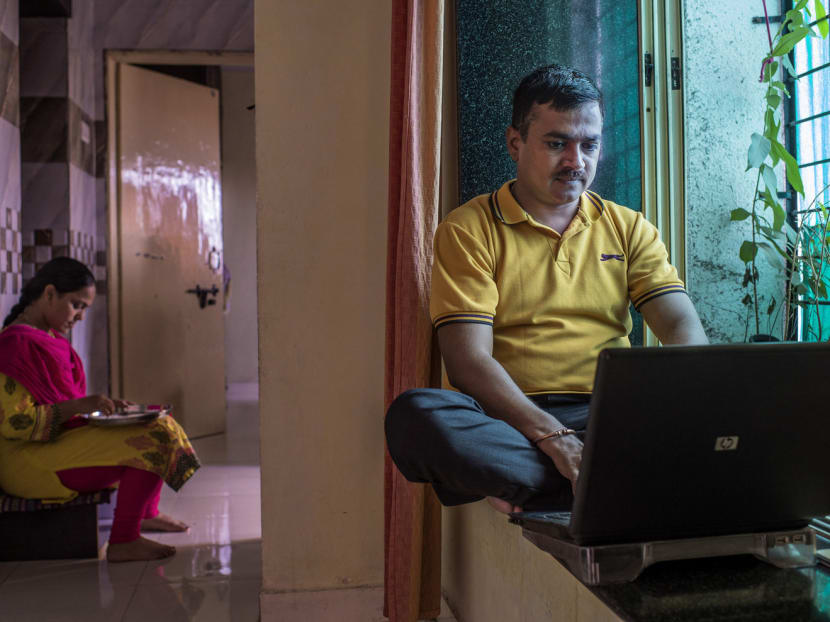Indian IT workers worry about a job threat: Technology
PUNE (INDIA) — Last month, Mr Sudhakar Choudhari took the company bus as usual from his one-bedroom apartment to the suburban offices of Tech Mahindra, a major employer of workers in India that powers the global technology machine behind the scenes. Then a manager took him into a conference room and asked him to resign.

Mr Sudhakar Choudhari, who recently lost his job at Tech Mahindra, searching for job listings in his one-bedroom apartment in Pune, India. Artificial intelligence, automation and big data are raising fears of widespread layoffs in India’s S$208 billion industry which employs about four million people. Photo: The New York Times
PUNE (INDIA) — Last month, Mr Sudhakar Choudhari took the company bus as usual from his one-bedroom apartment to the suburban offices of Tech Mahindra, a major employer of workers in India that powers the global technology machine behind the scenes. Then a manager took him into a conference room and asked him to resign.
“It was a terrible scene for me,” said the 41-year-old Mr Choudhari, who had been with the company for 11 years and most recently maintained software for a British client. As the manager spoke, he thought: “I have an 11-year-old child. My wife is not working. How to pay the home loans?”
Mr Choudhari is one of a number of Indian technology workers who have lost their jobs in recent months as many in India debate whether an industry that has long served as a gateway to the middle class is preparing to shed jobs en masse.
India’s information technology industry grew at a breakneck speed during the past two decades thanks to the trend commonly called offshoring. The industry and related businesses generate more than US$150 billion (S$208 billion) in annual revenue and employ about four million people to build and test software, to enter and analyse data, and to provide customer support for American and European companies looking for relatively inexpensive labour.
But the global tech industry is increasingly relying on automation, robotics, big data analytics, machine learning and consulting — technologies that threaten to bypass and even replace Indian workers.
For example, automated processes may soon replace the kind of work Mr Choudhari was performing for foreign clients, which involved maintaining software by occasionally plugging in simple code and analysing data.
“What we’re seeing is an acceleration in shedding for jobs in India and an adding of jobs onshore,” said Ms Sandra Notardonato, an analyst and research vice-president for Gartner, a research and advisory company.
“Even if these companies don’t have huge net losses, there’s a person who will suffer, and that’s a person with a limited skill set in India.”
Such job losses could be politically damaging to the government of Prime Minister Narendra Modi, who won an electoral mandate in 2014 on the promise of development and employment for a bulging youth population.
In January, near the three-year mark of his administration, an economic survey reported that job creation had stalled.
So far, the scale is not clear.
Mr T V Mohandas Pai, a long-time industry figure, estimates the cuts will encompass up to 2 per cent of the workforce by September, mainly from culling underperformers.
A 2015 study released by the National Association of Software and Services Cos, the Indian technology industry trade group known as (Nasscom), and McKinsey India found that 50 to 70 per cent of workers’ skills would be irrelevant by 2020.
Of course, new technologies will create new jobs. The effect of automation and artificial intelligence is still not clear, and they could open up new areas that simply shift tech work rather than eliminate it.
But some in the Indian tech industry worry that many of the new jobs will be created outside India, in places like the United States, in part because President Donald Trump has pledged to tighten visa laws that allowed many Indian nationals to go to that country to work. The Indian government has rushed to reassure the public that job losses will be minimal.
Mr Ravi Shankar Prasad, the Indian minister who oversees the technology industry, recently denied that major layoffs were occurring even as he encouraged the industry to speed up development. “The question of slackness in jobs is absolutely factually incorrect,” he said. “Obviously, those who don’t perform will have to go.”
Some tech employees who recently lost jobs disputed that they were underperformers.
“It is not something that only the employee is responsible,” Mr Choudhari said of upgrading his skills. Employers, he said, “are also responsible”.
For India, where household income by one measure is one-twelfth that in the US, such jobs have long been seen as a stepping stone.
Small-town and rural youths who aspire to join the urban middle class enrol in four-year university engineering programmes and graduate by the hundreds of thousands per year, many with the dream of a lifetime career at one of India’s outsourcing companies.
Competition is already fierce. Ms Ashwin Kotnala graduated this year with a bachelor’s degree in technology from Graphic Era University, a private university in Dehradun in northern India. She has applied for more than 20 positions but has yet to get one.
“Everyone wants to work with IT firms because of a good salary,” Ms Kotnala, 22, said. “I’ve not got placed, but if I get placed in IT company, then I’ll do better and make my parents proud.”
Finding a job can be even harder for experienced workers who need to refresh their skills. Mr Dinesh Shende, a 38-year-old developer at Tech Mahindra who said he was forced to resign in February, looked for work for months. Born to farmer parents in a village in the state of Maharashtra, he earned about US$37,000 a year.
“Now employers say reskilling is needed — it is your responsibility,” he said. “We are ready to reskill ourselves. But will the next company employ us?” THE NEW YORK TIMES








